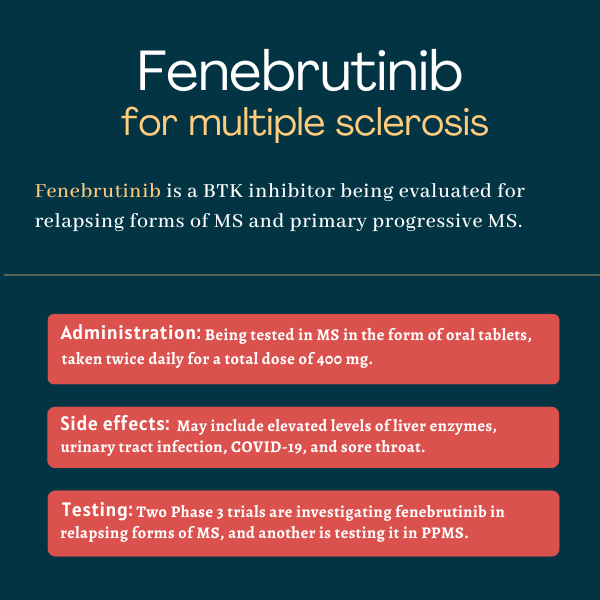
FAQs about fenebrutinib in MS
Fenebrutinib is an experimental medicine designed to reduce the inflammation that causes neurological damage in multiple sclerosis (MS). It works by blocking the activity of the BTK protein, which is integral to the inflammatory activity of B-cells and microglial cells. Data obtained so far suggest the therapy can significantly reduce relapses and lesions, and slow the progression of disability in people with relapsing forms of MS.
Fenebrutinib is being tested in people with relapsing forms of multiple sclerosis (MS) and primary progressive MS in three Phase 3 clinical trials. If the results of these studies are positive, they could support regulatory applications seeking U.S. Food and Drug Administration approval. It is too early to know if or when fenebrutinib will approved to treat MS.
Clinical trials in multiple sclerosis are not enrolling participants who are pregnant, and those with the ability to conceive are required to take measures to prevent becoming pregnant while in the studies. It is unknown whether fenebrutinib can be safely taken during pregnancy.
In the FENopta trial, which tested fenebrutinib in people with relapsing forms of multiple sclerosis, significant reductions in inflammatory lesions and in new or enlarging lesions were observed after three months of treatment. For some MRI measures, these benefits were observed as early as four weeks after starting treatment.
Neither hair loss nor weight gain has been reported as a side effect of fenebrutinib in multiple sclerosis clinical trials or in trials that enrolled people with other inflammatory conditions. If patients experience unanticipated side effects while trying new medications, they should discuss them with their healthcare teams.
 Fact-checked by
Fact-checked by 


